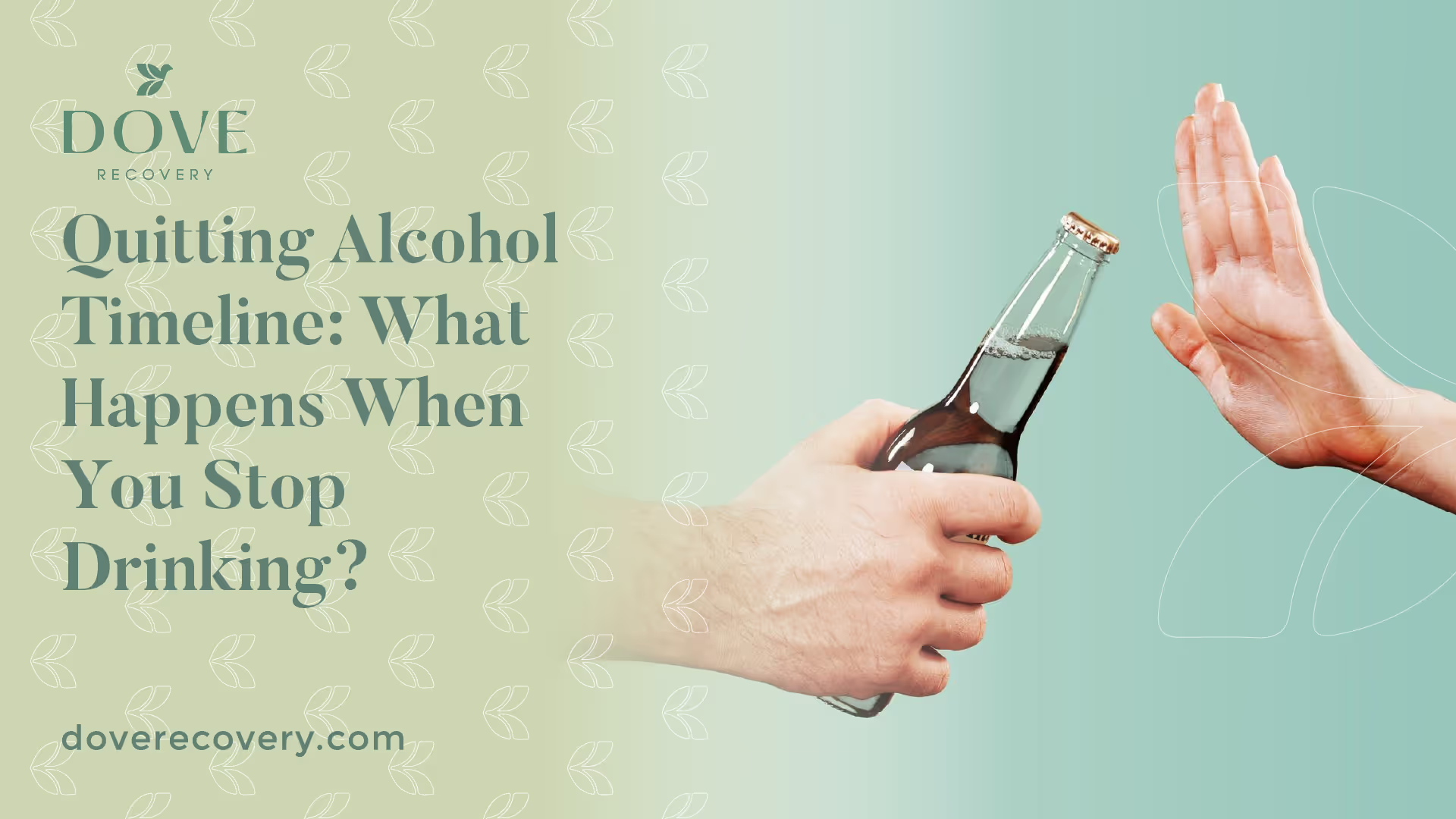Quitting Alcohol Timeline: What Happens When You Stop Drinking?


Quitting alcohol is a big step towards a healthier life. It's a decision that requires a lot of courage and determination. However, it's important to understand that there is a timeline associated with quitting alcohol. A timeline that outlines what happens to your body and mind when you stop drinking.
The First 24 Hours
Within the first 24 hours of quitting alcohol, your body starts to experience changes. The most noticeable change is that your blood sugar level drops. This can lead to symptoms such as anxiety, shakiness, and even seizures in some cases. However, these symptoms can be managed with proper medical care.
The First Few Days
During the first few days of quitting alcohol, you may experience withdrawal symptoms. These symptoms can include:
- Nausea
- Headaches
- Insomnia
- Rapid heartbeat
- Sweating
- Tremors

These symptoms can be managed with the help of a medical professional. It's important to stay hydrated during this time and get plenty of rest.
The First Week
After the first few days, your body starts to adjust to the absence of alcohol. During the first week, you may experience the following:
- Improved sleep
- More energy
- Better focus
- Improved digestion
- Weight loss

The First Month
After a month of not drinking alcohol, you may start to notice some significant changes. These changes can include:
- Clearer skin
- Weight loss
- More energy
- Improved mental clarity
- Better digestion

The First Year
After a year of not drinking alcohol, your body has had time to heal and repair itself. Some of the benefits of quitting alcohol after a year include:
- Improved liver function
- Lower blood pressure
- Reduced risk of heart disease
- Lower risk of certain types of cancer
Benefits of Quitting Drinking
Quitting drinking has numerous benefits that can improve your overall health and well-being. Here are some of the key benefits:
- Improved mental health: Alcohol consumption can exacerbate symptoms of anxiety and depression, and quitting can help alleviate these symptoms. By cutting out alcohol, you may experience improved mood, better sleep, and reduced stress.
- Better relationships: Drinking alcohol can often lead to strained relationships due to behavior changes or missed social engagements. By quitting alcohol, you may be able to repair damaged relationships or build new ones based on healthier habits. You may also find that you have more time and energy to invest in your relationships.
- Financial savings: Alcohol consumption can be expensive, especially if it becomes a daily habit. By cutting out alcohol, you may be able to save money and put it towards other things that are important to you, such as travel, hobbies, or paying off debt.
- Sense of accomplishment: Making the decision to quit alcohol takes strength and determination, and achieving this goal can boost your confidence in other areas of your life as well. You may feel a sense of pride and self-worth knowing that you have taken control of your habits and made a positive change for your health.
Overall, quitting drinking can be a challenging but rewarding journey that is worth considering if you are looking to improve your physical and mental well-being.
What are the Possible Complications of Quitting Alcohol?
While quitting alcohol has a multitude of benefits, it's important to be aware of the possible complications that can arise during the process. These complications can range from mild to severe and can vary depending on factors such as the length and severity of one's drinking history. Here are some of the potential complications of quitting alcohol:
- Delirium tremens (DTs): This is a severe form of alcohol withdrawal that can occur in some individuals. DTs usually start 2-5 days after quitting alcohol and can include symptoms such as confusion, agitation, fever, seizures, and hallucinations. This condition requires immediate medical attention, as it can be life-threatening if left untreated.
- Post-acute withdrawal syndrome (PAWS): This is a set of symptoms that can occur for months after quitting alcohol. PAWS can include mood swings, anxiety, insomnia, and difficulty concentrating. While these symptoms are not typically life-threatening, they can be challenging to manage and may require ongoing support from healthcare professionals.
- Dehydration and malnutrition: Quitting alcohol abruptly can put stress on the body and lead to dehydration or malnutrition if not managed properly. It's important to stay hydrated and eat a balanced diet while going through the withdrawal process.
Overall, while the benefits of quitting alcohol far outweigh the potential complications, it's important to be aware of these risks and seek medical guidance if needed. If you are considering quitting alcohol, it's a good idea to speak with your doctor or a healthcare professional who can provide guidance and support throughout the process.
Tips for Staying Motivated and Committed to Sobriety
Quitting alcohol can be a difficult journey, and staying motivated and committed to sobriety is crucial for long-term success. Here are some tips that can help you stay on track:
- Join a support group: Joining a support group such as Alcoholics Anonymous (AA) can provide you with a sense of community and accountability. You'll be able to connect with others who are going through similar experiences, share your struggles, and receive support and encouragement.
- Find healthy coping mechanisms: Drinking alcohol may have been your go-to coping mechanism in the past, but it's important to find healthier ways to manage stress and negative emotions. Consider activities such as exercise, meditation, or hobbies that you enjoy.
- Set achievable goals: Setting achievable goals can help you stay motivated and focused on your sobriety journey. Start with small goals such as going a week without drinking or attending one AA meeting per week. As you achieve these goals, gradually increase them.
- Stay accountable: Letting friends and family members know about your decision to quit drinking can help keep you accountable. They can offer support when you're feeling tempted or struggling, and remind you of the benefits of sobriety.
- Celebrate milestones: Celebrating milestones such as 30 days or 6 months of sobriety can help boost your motivation and remind you of how far you've come. Treat yourself to something special such as a nice dinner or a weekend getaway.
Remember that staying committed to sobriety is an ongoing process that requires patience, perseverance, and self-care. If you're struggling with staying motivated or need additional support, don't hesitate to reach out to a healthcare professional or addiction specialist who can provide guidance and resources.
Strategies for Managing Cravings During the Quitting Process
Quitting alcohol can be a challenging journey, and managing cravings is one of the biggest obstacles that people face. Here are some strategies that can help you manage cravings during the quitting process:
- Identify triggers: Identify the situations or emotions that trigger your cravings. Once you identify your triggers, you can develop a plan to avoid them or manage them more effectively.
- Find healthy distractions: When a craving hits, try distracting yourself with a healthy activity such as exercise, reading, or listening to music. Engaging in activities that you enjoy can help take your mind off of drinking.
- Practice relaxation techniques: Relaxation techniques such as deep breathing or meditation can help reduce stress and anxiety which are common triggers for cravings.
- Visualize success: Visualize yourself succeeding in your goal of quitting alcohol. Imagine how good it will feel to wake up feeling refreshed and energized every day.
- Seek support: Reach out to friends, family members, or a support group when you're struggling with cravings. Having someone to talk to who understands what you're going through can make all the difference.
Remember that managing cravings is an ongoing process. It's important to be patient with yourself and celebrate small victories along the way. With time and practice, managing cravings will become easier, and sobriety will become a natural part of your life.
The Benefits of Seeking Professional Support
Quitting alcohol can be a challenging journey, and seeking professional support can make all the difference in your success. Here are some benefits of seeking support from a healthcare professional or addiction specialist:
Medical monitoring
Quitting alcohol can lead to withdrawal symptoms that range from mild to severe. A medical professional can monitor your symptoms and provide medication or other interventions if needed.
Individualized treatment
Every person's experience with alcohol is unique, and a healthcare professional can develop a treatment plan tailored to your specific needs. This may include therapy, medication, or other interventions.
Access to resources
Healthcare professionals and addiction specialists have access to resources such as support groups, rehabilitation centers, and mental health services that can help you on your journey to sobriety.
Emotional support
Quitting alcohol can be an emotional process, and having someone to talk to who understands what you're going through can make all the difference. A healthcare professional or addiction specialist can offer emotional support and guidance throughout the quitting process.
Overall, seeking professional support when quitting alcohol can increase your chances of success and help you achieve long-term sobriety. If you're considering quitting alcohol, it's important to speak with a healthcare professional who can provide guidance and resources.
Exploring Alternative Therapies to Support Sobriety
While seeking professional support is important for quitting alcohol, some people also find it helpful to explore alternative therapies. These therapies can provide additional support and help manage symptoms of withdrawal or cravings. Here are some alternative therapies that may be helpful:
Acupuncture
Acupuncture is a traditional Chinese medicine practice that involves inserting thin needles into specific points on the body. It has been used to treat a variety of conditions, including addiction. Acupuncture may help reduce anxiety, stress, and other symptoms of withdrawal.
Hypnotherapy
Hypnotherapy is a type of therapy that uses hypnosis to help individuals change their behavior or thought patterns. It can be used to address underlying issues that may contribute to addiction, such as stress or trauma.
Meditation
Meditation is a practice that involves focusing the mind on a particular object, thought, or activity to achieve a mentally clear and emotionally calm state. It can help reduce stress and anxiety and improve overall well-being.

Yoga
Yoga is an ancient practice that combines physical postures, breathing techniques, and meditation. It can help reduce stress and anxiety while improving flexibility and balance.
While these alternative therapies may not work for everyone, they can provide additional support during the quitting process. If you're interested in exploring alternative therapies, speak with your healthcare professional or addiction specialist who can provide guidance and resources.
Conclusion
Quitting alcohol is a personal decision that can have a significant impact on your life. It's important to understand the quitting alcohol timeline and the changes that happen to your body and mind when you stop drinking. If you're struggling with quitting alcohol, seek the help of a medical professional or a support group. Remember, you're not alone and there is always help available.
Sources:
- https://www.healthline.com/health/what-happens-when-you-stop-drinking-alcohol-timeline
- https://www.niaaa.nih.gov/publications/brochures-and-fact-sheets/treatment-alcohol-problems-finding-and-getting-help
